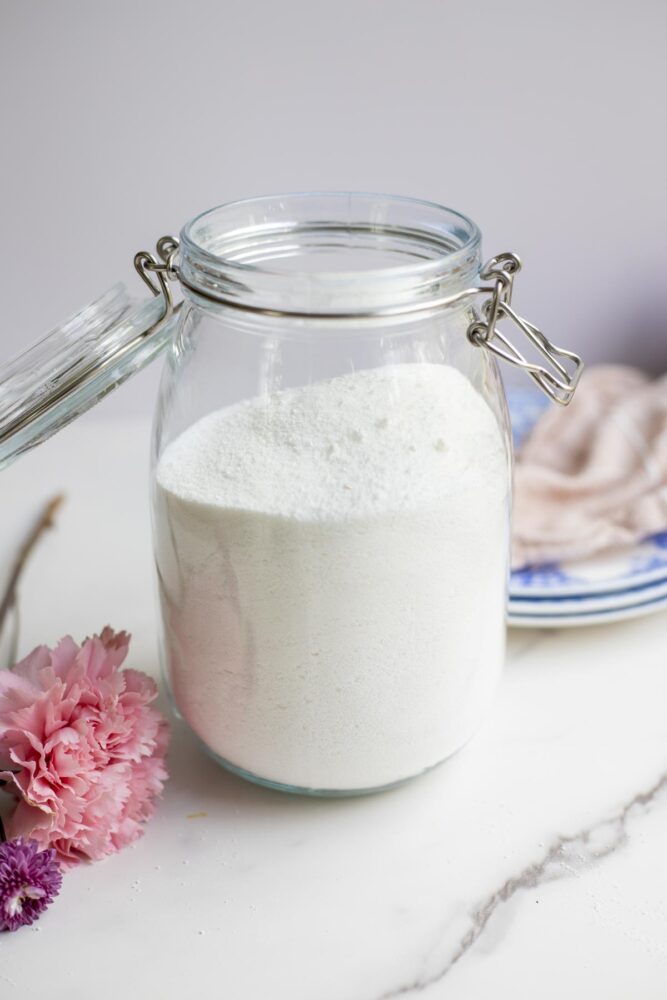Homemade dishwasher detergent is a simple, inexpensive, and effective way to wash the dishes. All you need are a few simple ingredients and two minutes to make this DIY dishwasher detergent recipe.
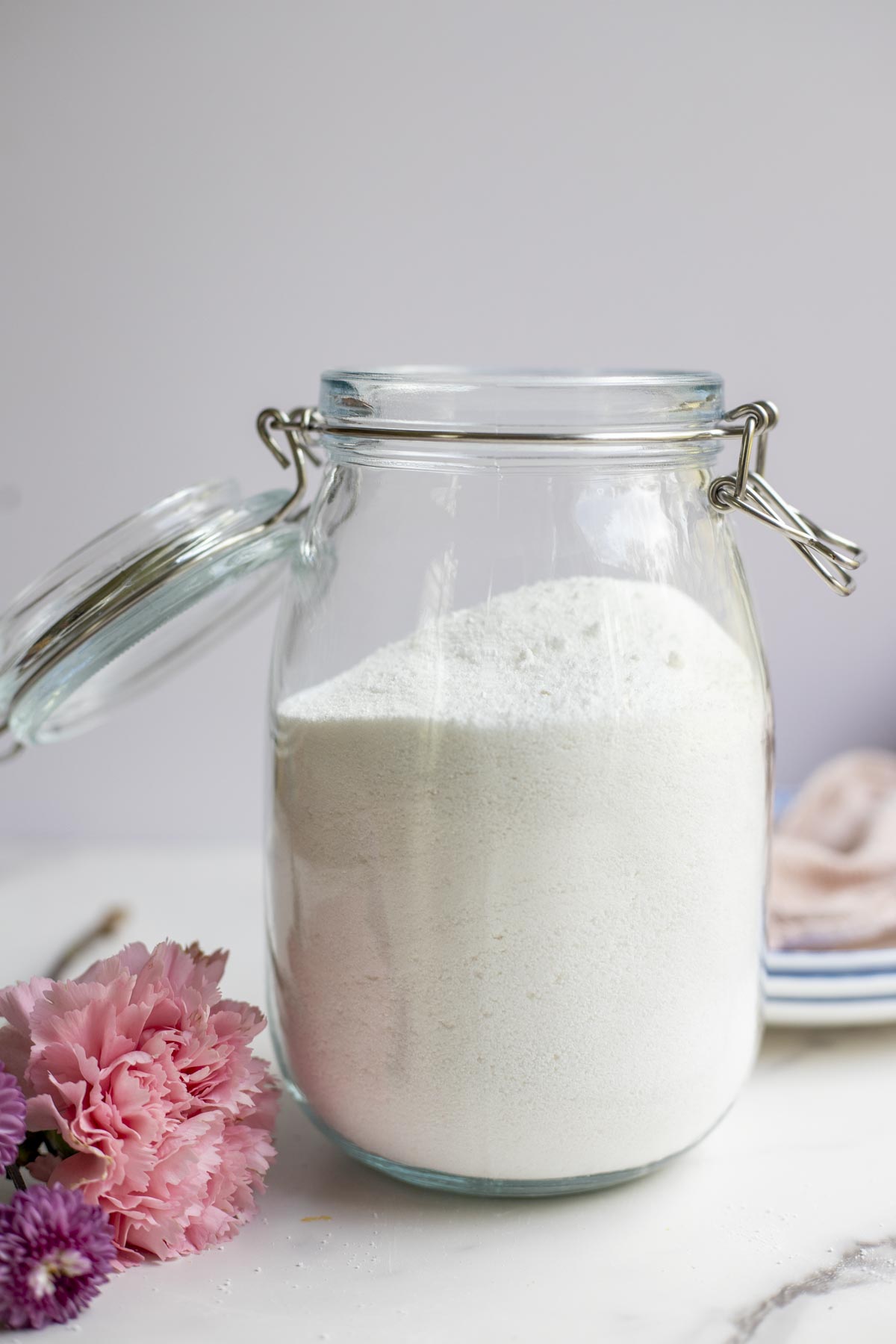
This recipe to make your own dishwasher detergent is so frugal and so easy. You have to try it! It only takes about two minutes to whip up, costs a few dollars per batch to make, and should last about 100 loads.
I created this recipe 12 years ago, when my husband and I were pinching pennies and trying to live a more natural lifestyle. Little did I know this recipe would be the catalyst to becoming more crunchy.
This homemade dishwasher detergent works better than store-bought versions. It is a great recipe for beginners who want to make more homemade items and avoid purchasing commercial brands that contain ingredients you aren’t familiar with or can’t even pronounce.
If you are trying to make the switch to more natural cleaning products you should try my recipes for homemade cleaners: granite cleaner, furniture polish, and my favorite all-purpose cleaning spray. They are all cleaners you can feel good using at home around your kids and pets.
This recipe is a much more natural version of dishwasher detergent than many of us can find in our local grocery store. Cheap and more natural? Sign me up!
Why You Will love this recipe
- Inexpensive: A batch of this recipe costs about a dollar and lasts for approximately 50 loads, which is less than a penny per load. In comparison, commercial detergents can cost several dollars per load over time. Again, explain the math here, OR we need new math.
- Quick: this recipe comes together in 2 minutes. Add in clean-up, and your total time commitment is under 5 minutes.
- Natural: by making your own homemade dishwasher detergent you can control the ingredients and ensure they are natural and safe for your family and the environment.
- Effective: This detergent, with it’s natural ingredients, will make those dirty dishes shine.
Ingredients
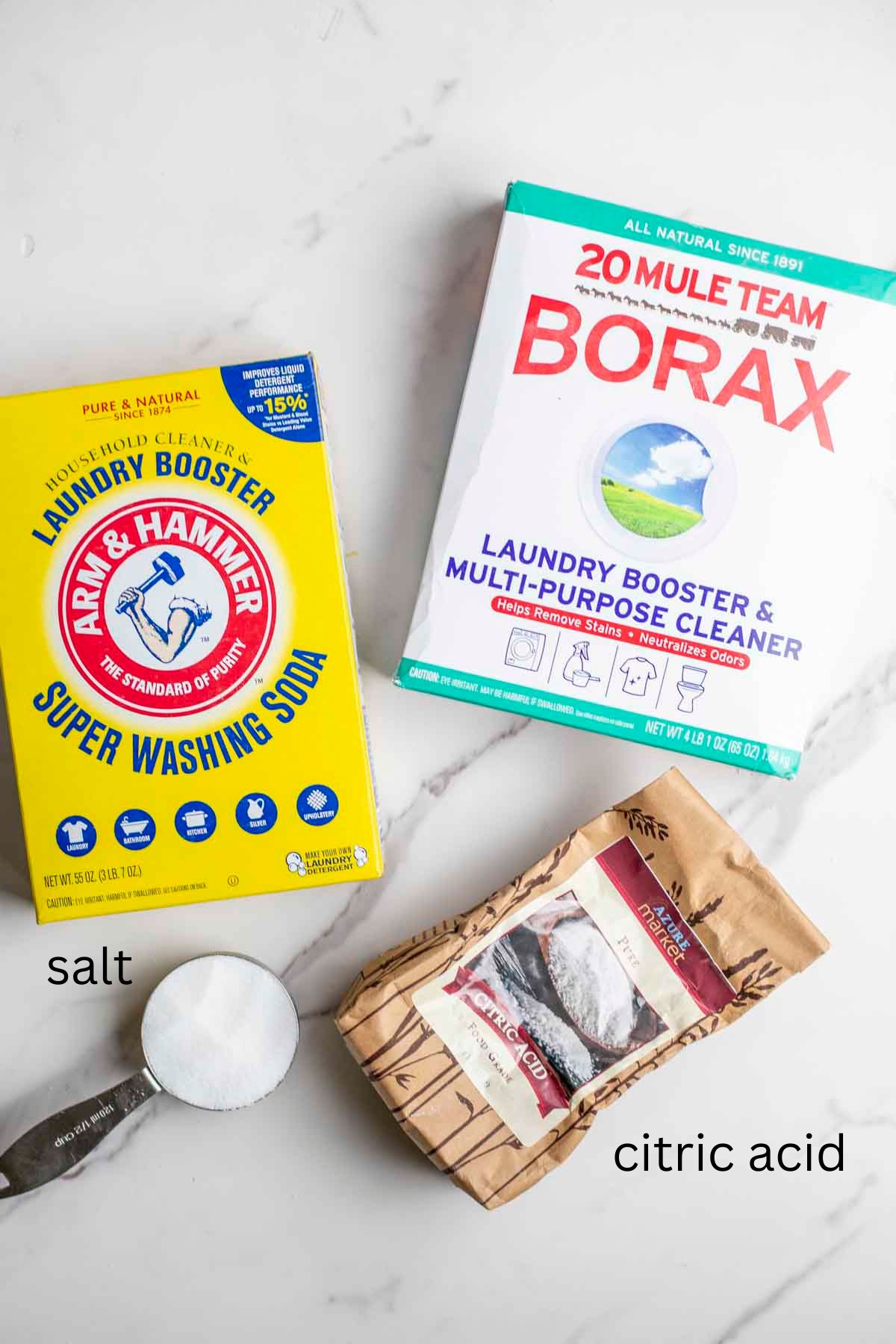
There are only a few basic ingredients necessary to make this natural cleaner:
Borax: a naturally occurring mineral salt, helps soften hard water and fights stains and food buildup. This is much cheaper at a grocery store.
Washing Soda (sodium carbonate): effectively cuts through grease and oil.
Citric Acid: is a natural acid found in citrus fruits. It helps in breaking down grease and food residues.
Salt: I like to use sea salt or kosher salt. This is added to soften the water and help reduce mineral buildup. Some people say not to use sea salt as it can contain minerals, but I haven’t had any issues. I wouldn’t recommend using Redmond’s salt or another type of salt that does have a lot of minerals in it.
Essential oils: Optional. If you want your dishes to have a pleasant scent, you can add a few drops of an essential oil, like lemon oil, to your detergent mix. However, be cautious as some essential oils might not be suitable for use in dishwashers.
A list of the remaining ingredients can be found in the recipe card.
Tools Needed
Bowl
Glass jar
Measuring cups and spoons
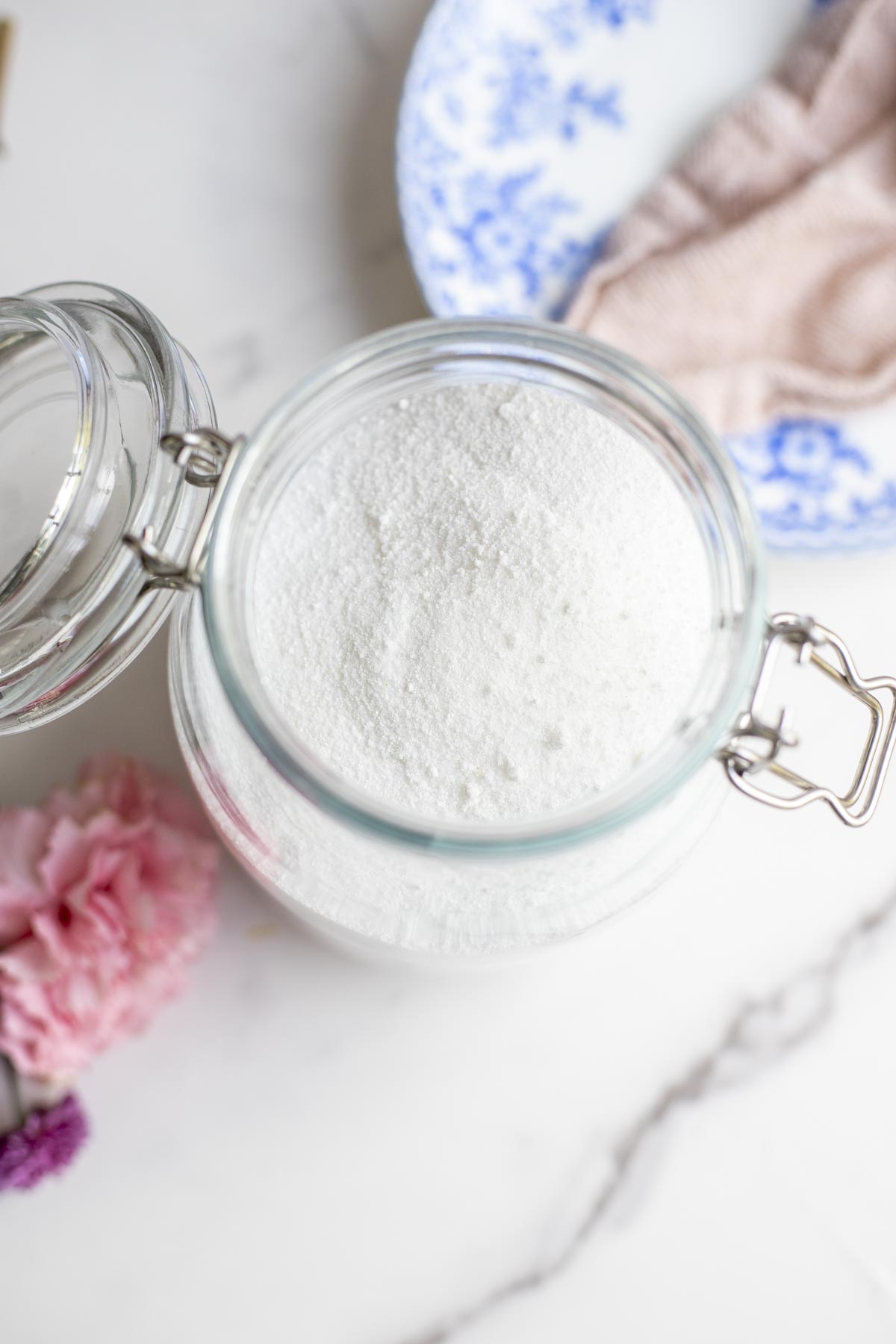
How To Make Homemade Dishwasher Detergent
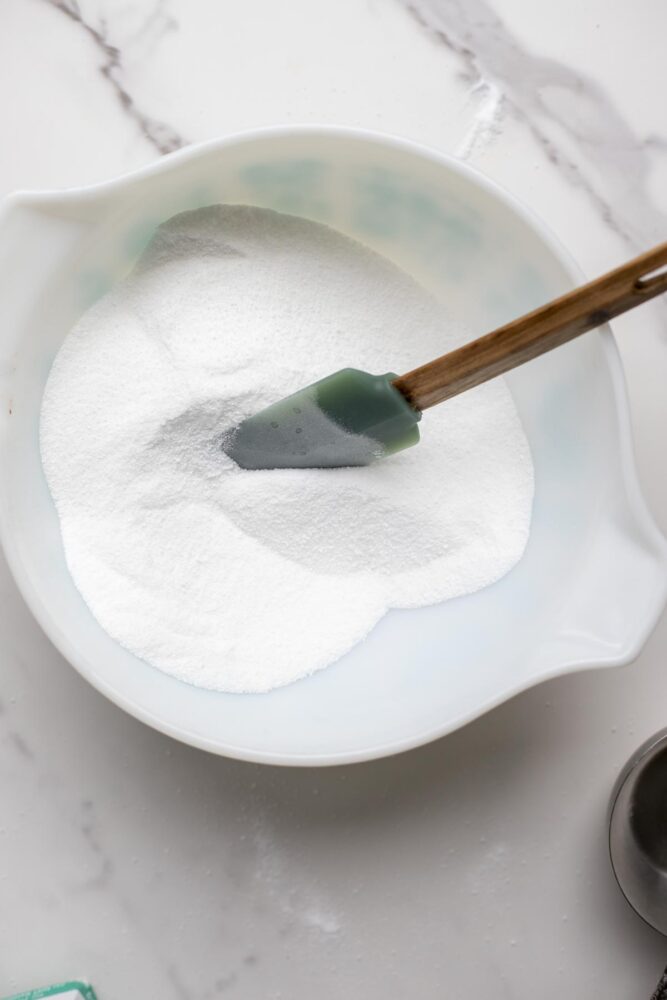
Step 1: Carefully mix the borax, washing soda, and citric acid together in a large bowl using a spoon.
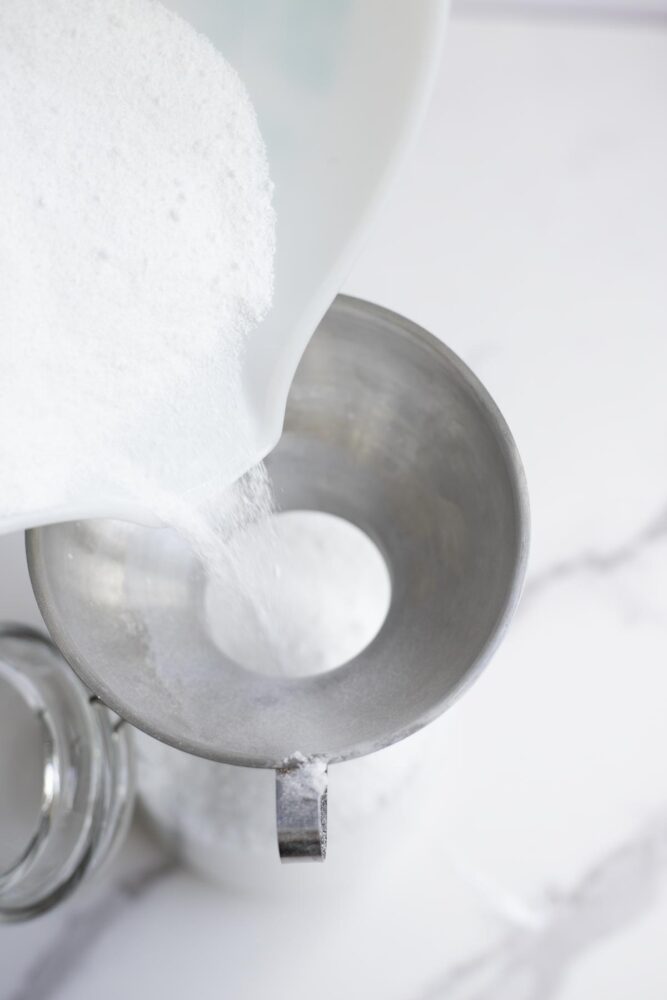
Step 2: Store in an airtight container. A glass jar or mason jar works well for this purpose.
To Use:
To do a load of dishes with your newly made dishwasher soap: Place 1 Tbs of the mixture in the pre-wash (open cup) and 1 Tbs in the main wash (closed cup) and run a regular wash cycle.
Tip: I find that if you put a drop of natural dish soap in the detergent compartment along with your detergent it makes your dishes much more sparkly!
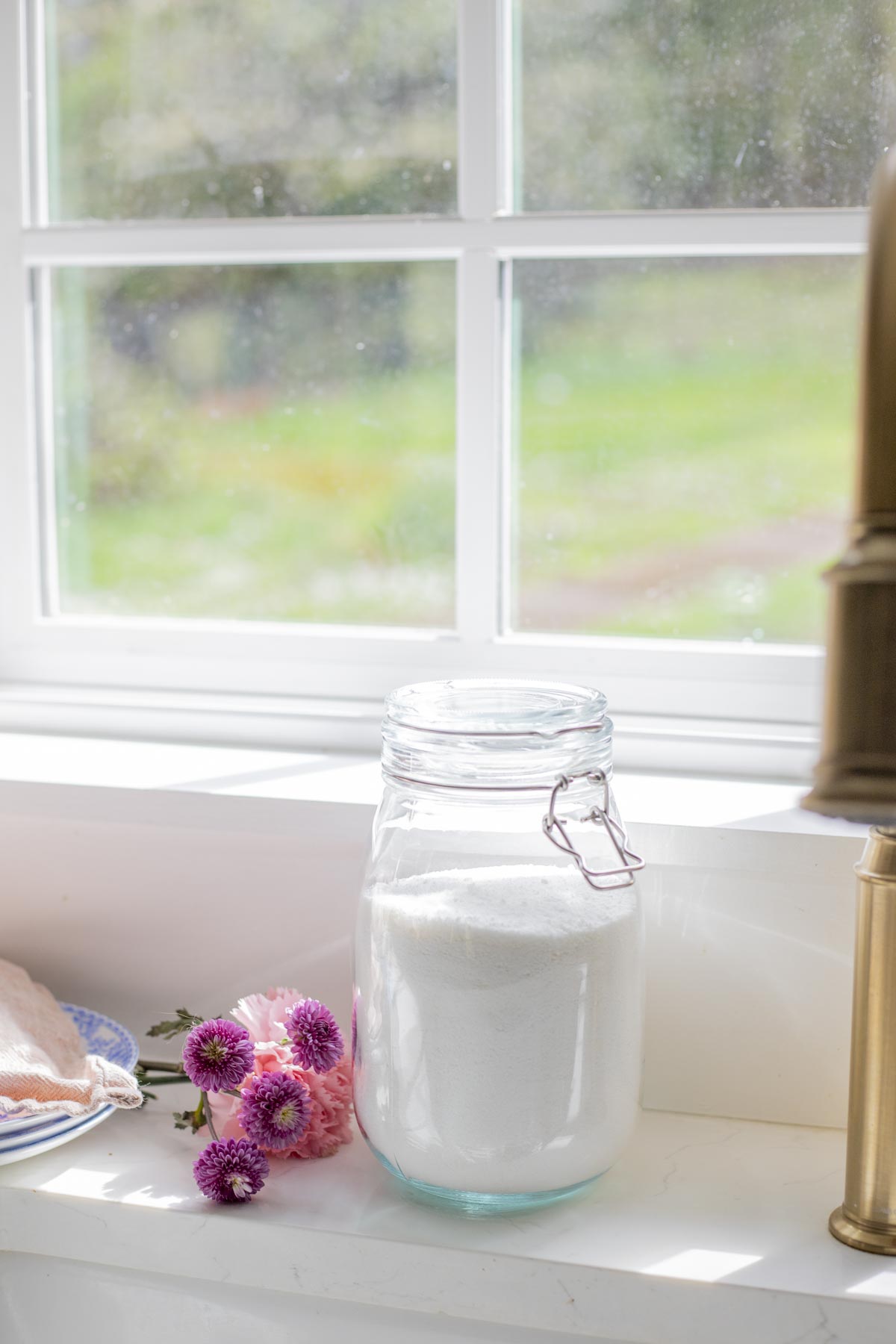
Tips For Using Homemade Dishwasher Detergent
- Use 1 tablespoon in both the pre-wash cup and the main wash cup.
- Add white vinegar as a natural rinse aid for a natural way to get sparkly dishes.
- Different water types can have different results with DIY dishwasher detergent. If you are getting any cloudiness, or food residue left on your dishes, add a few drops of natural dish soap to the mix.
- If you have hard water, you might need to use more detergent or add a water softener to your dishwater.
- If you notice a white film on your dishes, it might be due to hard water minerals. Using white vinegar in the rinse cycle can help remove this.
- To prevent mineral deposits, make sure to use the correct amount of detergent and rinse aid.
- For heavily stained dishes, pre-treat them with baking soda or lemon juice before loading them into the dishwater.
- For best results, use hot water in your dishwater cycle.
Storage
The best way to store DIY dishwasher detergent is in a glass jar or other airtight plastic container. You could even reuse old laundry detergent boxes for storing your homemade detergent.
The only thing you have to consider about when storing this dishwasher powder is making sure it stays dry.
FAQ’s
This has been up for debate for some time. Katie over at the Wellness Mama has a great article here. Basically, there isn’t conclusive evidence of it being bad for you.
You can add a few drops of dish soap and fill the rinse aid compartment with white vinegar. That should get rid of any water spots or cloudiness. You can also add a tsp of baking soda to the dishwasher to help against lime buildup (white film).
You betcha. When I’m strapped for time, I will frequently reach for Seventh Generation powder. Biokleen also scores an A on EWG, as does Ecos, Fit Organic, and Mama Suds.
Want some more DIY Natural Products? Try these!
If you try this recipe and love it, I would love if you could come back, comment on the post, and give it 5 stars! Please and thank you. Tag me on Instagram @ablossominglife.
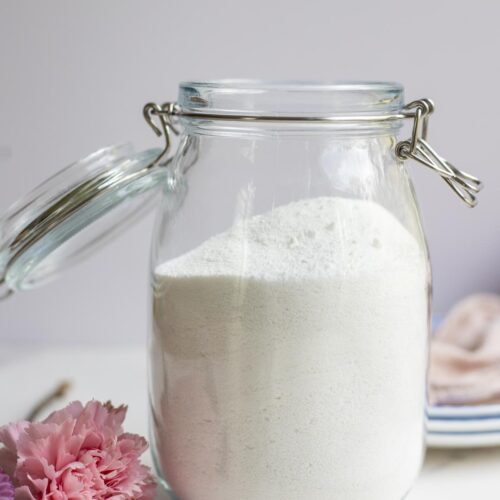
- Use 1 tablespoon in both the pre-wash cup and the main wash cup.
- Add white vinegar as a natural rinse aid for a natural way to get sparkly dishes.
- Different water types can have different results with DIY dishwasher detergent. If you are getting any cloudiness, or food residue left on your dishes, add a few drops of natural dish soap to the mix.
- If you have hard water, you might need to use more detergent or add a water softener to your dishwater.
- If you notice a white film on your dishes, it might be due to hard water minerals. Using white vinegar in the rinse cycle can help remove this.
- To prevent mineral deposits, make sure to use the correct amount of detergent and rinse aid.
- For heavily stained dishes, pre-treat them with baking soda or lemon juice before loading them into the dishwater.
- For best results, use hot water in your dishwater cycle.

